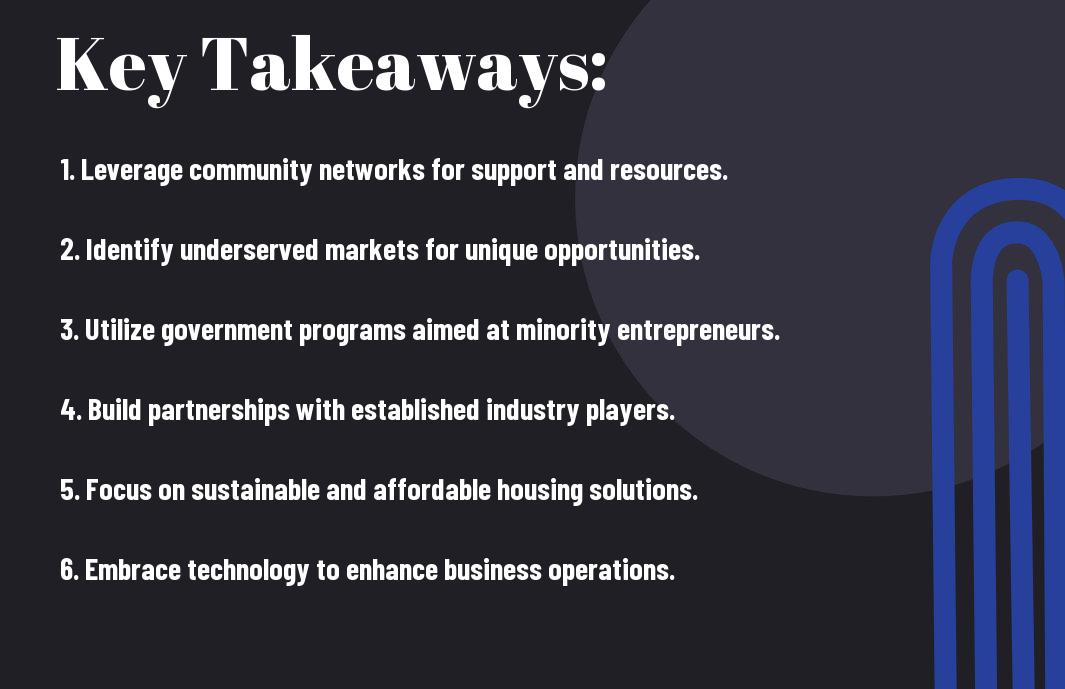Most aspiring Black entrepreneurs may not realize the untapped potential within the housing and real estate development sectors. With a growing demand for diverse voices and perspectives, you have the chance to carve out a niche and positively impact your community. This post will guide you through strategies and insights to help you navigate the complexities of real estate, enabling you to leverage opportunities that can lead to sustainable success and financial growth. Dive in, and discover how you can turn your vision into a thriving reality.
Key Takeaways:
- Networking: Building strong connections within the industry is imperative for accessing resources, mentorship, and partnership opportunities.
- Funding Access: Identifying and utilizing various funding sources, such as grants, loans, and investment opportunities, can significantly support real estate ventures.
- Market Research: Thoroughly understanding market trends and community needs allows entrepreneurs to make informed decisions and identify lucrative investment opportunities.

Understanding the Housing and Real Estate Market
For anyone looking to enter the housing and real estate market, it’s vital to grasp its dynamics. Understanding local market conditions, demand and supply factors, zoning regulations, and financing options can provide you with a significant advantage. By gaining insights into these aspects, you can identify promising investment opportunities and make informed decisions that align with your goals.
Current Trends and Statistics
Beside broadening your understanding, being aware of current trends and statistics is vital. The housing market is influenced by various factors such as interest rates, demographic changes, and economic shifts. Tracking these trends will enable you to anticipate market movements and identify lucrative niches that align with your entrepreneurial vision.
Key Players and Stakeholders
Any successful venture in real estate requires knowing the key players and stakeholders involved. Building relationships with local developers, real estate agents, investors, and community organizations can open doors for collaboration and opportunities, expanding your network and resources in the process.
Estate agents play a key role in the real estate ecosystem, acting as intermediaries who facilitate transactions between buyers and sellers. Local developers and contractors influence the construction and renovation aspects, while financial institutions provide necessary funding options. Engaging with these stakeholders is vital; it empowers you to navigate the market more effectively and position yourself for success in your entrepreneurial endeavors.

Identifying Opportunities in Real Estate Development
If you want to succeed in real estate development, it’s important to identify opportunities that align with market demands and community needs. This requires a keen understanding of the local landscape, including economic trends and population shifts. By leveraging your unique perspective, you can spot gaps in the market and position yourself effectively to offer solutions that both enhance communities and drive profitability.
Market Analysis and Research
One effective way to find opportunities is through market analysis and research. This process involves examining various metrics, such as property values, rental rates, and demographic shifts. By collecting and analyzing this data, you can uncover trends that highlight where demand is increasing and where you can enter the market with confidence.
Niche Markets and Emerging Areas
By exploring niche markets and emerging areas, you can carve out your space in the competitive real estate landscape. These sectors often include specific demographics or underserved communities that require tailored housing solutions, allowing you to meet distinct needs while maximizing your investment potential.
But it’s important to approach niche markets and emerging areas with diligence. Researching neighborhoods undergoing revitalization or demographic shifts can reveal hidden opportunities. Keep an eye on areas where the local government is investing in infrastructure or services, as this often signals growth. By focusing on these markets, you can position yourself as a pioneer, tapping into unmet needs and creating strong community ties while leveraging your unique perspective as a Black entrepreneur.
Access to Capital and Financial Resources
Your ability to access capital and financial resources directly impacts your success in housing and real estate development. Understanding the various funding options available and building relationships with investors can empower you to navigate the complexities of financing your projects. By exploring these avenues, you can position yourself for growth and opportunity in a competitive market.
Funding Options for Entrepreneurs
At your disposal are numerous funding options that can support your real estate ventures. These may include traditional bank loans, private lenders, crowdfunding platforms, and grants tailored for entrepreneurs in your community. Each option presents unique advantages, and it is imperative to assess which aligns best with your goals and project needs.
Building Relationships with Investors
By actively networking and engaging with potential investors, you can cultivate relationships that may lead to valuable funding opportunities. Understanding their interests and investment criteria will help you align your projects with their goals and increase your chances of securing necessary financial backing.
Resources such as local business incubators, networking events, and online platforms can facilitate connections with investors who share your vision for housing and real estate development. Attend industry events, join relevant organizations, and leverage social media to expand your network. By fostering genuine relationships, you’ll create a support system that not only offers funding but also mentorship and insight into the market.
Overcoming Barriers and Challenges
Once again, Black entrepreneurs face a landscape filled with barriers and challenges in housing and real estate development. The path is often riddled with systemic obstacles, including limited access to funding, a lack of mentorship, and fewer networking opportunities. However, by actively seeking support and leveraging community resources, you can navigate these hurdles effectively. Building a strong foundation through knowledge and resilience will empower you to rise above these challenges and make a lasting impact in the industry.
Discrimination and Structural Inequality
Against a backdrop of discrimination and structural inequality, you may find it difficult to gain equal footing in the real estate market. Historical biases can manifest in various forms, from unjust lending practices to exclusion from important networks. Acknowledge these disparities and take proactive steps to educate yourself on your rights, enabling you to advocate for equitable treatment and access. Building a robust support network within the community will also play a vital role in overcoming these challenges.
Strategies for Resilience and Success
Overcoming the obstacles you face requires strategic planning and adaptability. Embracing resilience involves cultivating a growth mindset and continuously seeking new opportunities for learning and connection. You can engage with community organizations, attend relevant workshops, and form alliances with other entrepreneurs to share resources and knowledge. Being proactive in your pursuits not only fosters personal growth but also strengthens your position within the industry.
A strong strategy for resilience and success should involve continuous education about market trends and investment opportunities in housing and real estate. Surround yourself with mentors who uplift you and provide insights, while also seeking partnerships that align with your vision. Prioritize networking with others who share your objectives, as collaborating can multiply your potential for success. By taking these steps, you not only enhance your business acumen but also reinforce your standing in a competitive field.
Building a Strong Network and Community Support
Many successful Black entrepreneurs in housing and real estate development understand the importance of building a robust network and establishing community support. By connecting with like-minded individuals and organizations, you can gain access to valuable resources, mentorship, and partnerships that will help you navigate the unique challenges in this industry. Building these relationships will not only enhance your credibility but also create opportunities for growth and collaboration.
Collaboration with Other Entrepreneurs
About collaborating with other entrepreneurs, you can share insights, resources, and strategies that can propel your ventures forward. Working with others who share similar goals allows you to leverage combined strengths, tackle challenges more effectively, and create innovative solutions that benefit all parties involved.
Engaging with Local Organizations
Building relationships with local organizations can amplify your efforts and extend your reach within the community. These organizations often have established networks, resources, and expertise that can be invaluable as you work to create a successful real estate business.
Understanding your local landscape is key to engaging with organizations that champion community development. By actively participating in local chambers of commerce, trade associations, and non-profit agencies, you can establish connections that lead to potential collaborations, funding opportunities, and support for your initiatives. These relationships not only empower you but also reinforce your commitment to enriching the communities you serve.
Leveraging Technology and Innovation
Now, technology and innovation have become game changers in the housing and real estate sector, offering you unique tools to streamline processes and enhance your approach to development. Embracing advancements like virtual reality for property tours or using data analytics for market research can position you ahead of competitors while improving your engagement with potential clients. By continuously exploring emerging tech, you can identify new strategies that not only elevate your business but also foster community engagement.
Utilizing Real Estate Platforms
Behind every successful deal in real estate lies the effective use of various online platforms. You can leverage established real estate websites to showcase your properties, connecting with a broader audience while accessing market insights. Additionally, these platforms often provide tools for advertising, networking, and even property management, streamlining your operational processes. By strategically utilizing these resources, you position your business for greater visibility in the marketplace.
Adopting Sustainable Practices
An enhanced focus on sustainability is not just about being environmentally friendly; it’s a smart business decision. By incorporating sustainable practices in your projects, you can reduce costs, attract eco-conscious buyers, and contribute positively to the community.
Even as sustainable living becomes more popular, integrating eco-friendly building materials, energy-efficient systems, and renewable resources into your real estate development can significantly enhance your projects’ appeal. Not only does this align your initiatives with global sustainability trends, but it can also lead to long-term financial savings and increased property values. By prioritizing sustainability, you demonstrate your commitment to fostering healthier communities while positioning your business as a forward-thinking leader in the industry.
Final Words
Taking this into account, you can effectively seize opportunities in housing and real estate development by leveraging your unique insights and experiences. Embrace networking within your community and seek partnerships that align with your vision. Stay informed about market trends and regulations to identify gaps you can fill. By investing in education and mentorship, you can build the skills necessary to navigate the complexities of the industry. Your determination and innovative approach will empower you to create impactful solutions that benefit not only yourself but also your community.
Q: What are some key strategies for Black entrepreneurs to enter the housing and real estate development market?
A: Black entrepreneurs can adopt several strategies to effectively enter the housing and real estate development market. First, they should leverage community knowledge by identifying underserved areas and engaging with local residents to understand their needs. Networking is also imperative; entrepreneurs can connect with professionals in the industry, such as real estate agents, contractors, and city planners, to gain insights and support for their projects. Additionally, seeking mentorship from established figures in the real estate sector can provide valuable guidance and facilitate access to resources and financing options.
Q: How can Black entrepreneurs access funding for their real estate projects?
A: Accessing funding can be a challenge for Black entrepreneurs in real estate, but there are various avenues to explore. They can consider applying for grants specifically aimed at minority-owned businesses or the housing sector. Building strong relationships with community banks or credit unions that prioritize lending to local entrepreneurs may also provide financial opportunities. Furthermore, entrepreneurs can explore crowdfunding platforms, which allow them to raise capital by pitching their projects to a broader audience. Developing a solid business plan and presenting it effectively can attract potential investors who are interested in supporting minority-led ventures.
Q: What role does community involvement play in the success of housing and real estate development for Black entrepreneurs?
A: Community involvement is pivotal for Black entrepreneurs in housing and real estate development. By actively engaging with community members, they can gain insight into the housing needs and preferences of local residents, which allows them to create projects that truly benefit the community. This involvement fosters trust and goodwill, making it easier to secure necessary support from residents and local leaders. Additionally, by emphasizing community-centric development, entrepreneurs can enhance the social impact of their projects, leading to greater long-term sustainability and potential partnerships with local organizations and government agencies focused on urban development and revitalization.








